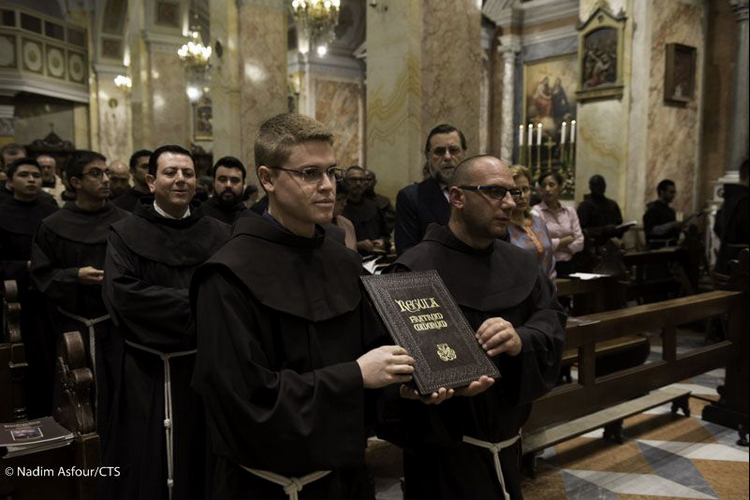They waited with trepidation and prepared themselves with a triduum of prayer and reflection. Every year, the solemnity of St. Francis is a reason for great joy for the Franciscans of the Custody of the Holy Land. The friars and the faithful celebrated it on October 3 and 4 at St. Savior’s Church in Jerusalem with First Vespers, the Transitus, the solemn mass and Second Vespers.
St. Francis of Assisi died on October 3, 1226, repeating the words from Psalm 141 of the soul that abdandons itself to the God’s mercy. In 1228, he was already declared a saint. We remember him today as the “poor father of Assisi,” but also as the “Seraphic Father”: with his [seemingly] little life he left a great mark on the life of the Church and on history.
The Father Custos of the Holy Land, Fr. Francesco Patton, presided over First Vespers and the Transitus. During the celebration, the friars who had not yet made their solemn vows renewed their temporary vows. “St. Francis says: ‘with our religious profession, our whole lives must be delivered into the hands of Jesus Christ.’ And this is the profound meaning of the vows of obedience, sine proprio and chastity that you renew today,” said the Custos in his homily. At the end of his life, St. Francis himself wished to consecrate himself to God in the most authentic way possible: naked on the naked earth. “[This was] a gesture of extraordinary symbolic meaning because it expresses the totality of self-giving,” said Fr. Patton. In that gesture, there is the nakedness of obedience, poverty and chastity, with which the body becomes the spiritual sacrifice [that is] pleasing to God. The Custos then emphasized that in the Transitus, there is an indication of the paschal mission. This abandonment to God, so as to be reborn with him, was also referred to in reading the narrative of St. Francis’s Transitus until the time when darkness came. From the darkness, the light in the Church shone again to the notes of the Canticle of the Creatures, composed by the saint.
As per tradition, a Dominican priest, Fr. Martin Staszak, Prior of Jerusalem, presided over the mass for the Feast of St. Francis. The Franciscans do the same for the feast of St. Dominic every year. Fr. Jean Jacques Pérennès, rector of the École Biblique et Archéologique Française de Jérusalem, said in his homily: “Our two orders arose from the same intuition: the need for an evangelical awakening.” The Dominican spoke about “preaching the Gospel without resorting to the means of power.” St. Francis and St. Dominic, experienced this but “how can we transmit the message, teach, catechize, preach, if we are this poor?” Fr. Jean Jacques asked. “Francis, like Dominic, tells us that it is precisely through this abandonment that we can truly become disciples.”
Also present were Mons. Marco Formica, Mons. Pizzaballa and Mons. Joseph Jules, as well as the representatives of the Syriac-Catholic and Maronite churches. The consuls general of Spain, Italy, France, Belgium and the representative of the Jerusalem police department were also seated in the front rows.
“This is the first time I come for the feast of St. Francis in Jerusalem and it is a real joy,” said a woman while having refreshments at the monastery. I loved the songs very much. It was a celebration in the Franciscan spirit.” For two philosophy students from Ein Karem, this was also their first feast of St. Francis at the Custody. “We have been here a short time, and everything is very different than Bolivia, where I come from. Everything is more solemn with the organ,” said Br. Oscar. Br. Josué continued: “Celebrating this way helps [encourage] the participation of the spirit.”
In the afternoon, Second Vespers brought the feast to a close. In a more collected and meditative atmosphere, the friars prayed under the statue of St. Francis, and they kissed the little relic and chanted the Magnificat. So as not to leave the solemnity in vain, Fr. Marcelo Cichinelli, guardian of St. Savior’s, concluded: “We welcome the invitation of Francis to stand before the cross, to look at Christ crucified and made man for us, to spend time with him, to read in the cross the book of salvation.”
Beatrice Guarrera


